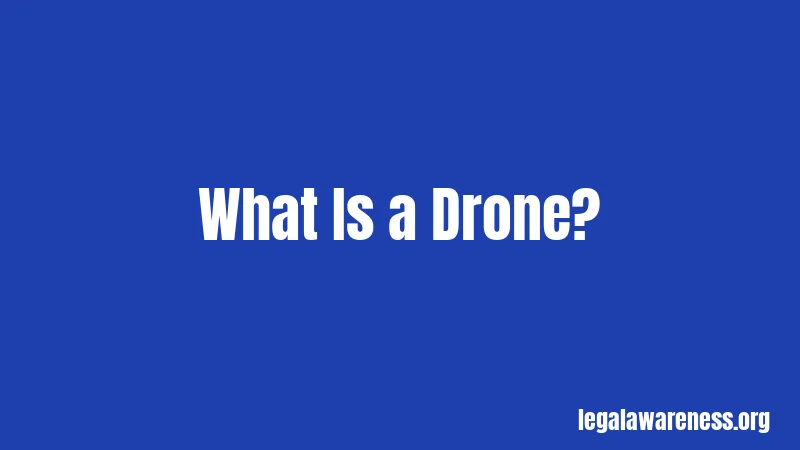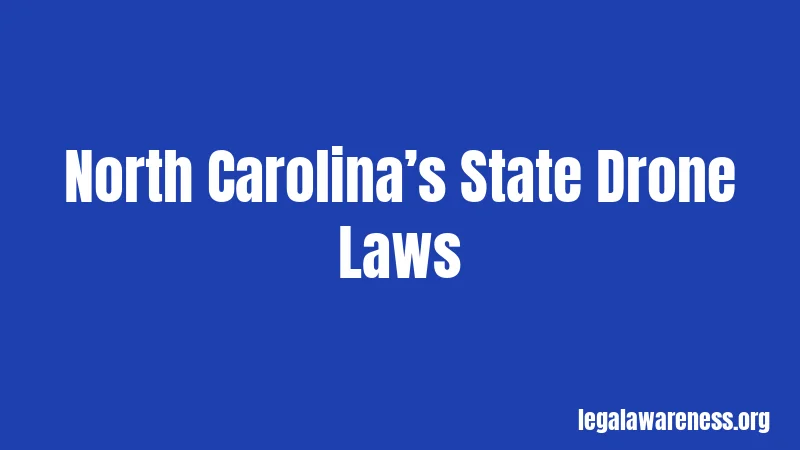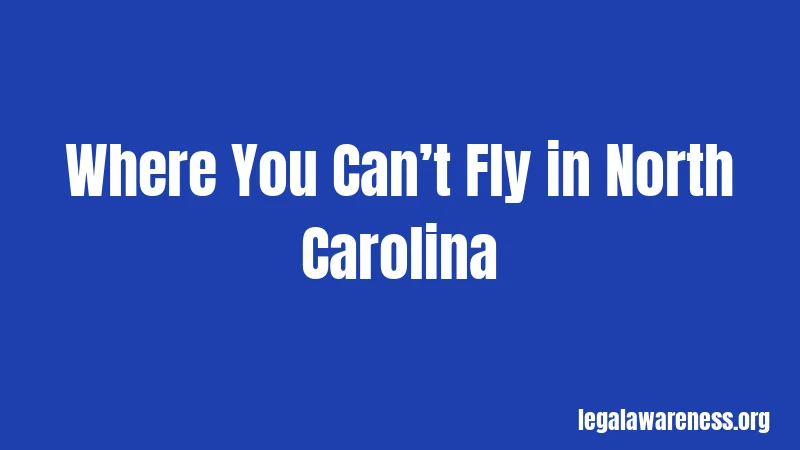Drone Laws in North Carolina (2026): Flying Smart and Legal
Most people have no idea how strict North Carolina’s drone laws actually are. You might think you can just fly your drone anywhere. That’s not how it works. North Carolina has some of the toughest drone regulations in the country, and breaking them can land you in serious trouble.
Let’s break down what you need to know before you launch that drone into the sky.
What Is a Drone?

A drone is an unmanned aircraft system, or UAS. It’s any aircraft that flies without a pilot inside. This includes everything from tiny toy drones to massive commercial units.
In North Carolina, the law defines a drone as any aircraft operated without human control from inside or on the aircraft. Pretty straightforward. If it flies and has no person physically controlling it from the aircraft itself, it’s a drone.
The state doesn’t care if you paid $50 or $5,000 for your drone. The same rules apply to everyone.
Basic Federal Drone Rules
Here’s the deal. The Federal Aviation Administration controls all U.S. airspace. That means federal rules apply everywhere in North Carolina.
You must follow these FAA regulations no matter what. Stay below 400 feet above ground level. Keep your drone in your line of sight at all times. Never fly over people or moving vehicles. Don’t fly near airports without permission.
These aren’t suggestions. They’re federal law.
For recreational flying, you need to pass something called the TRUST test. It’s free and takes about 30 minutes online. Commercial pilots need a Part 107 Remote Pilot Certificate from the FAA.
Wondering if this applies to you? If your drone weighs more than 0.55 pounds (250 grams), you must register it with the FAA. The registration costs $5 and lasts three years.
North Carolina’s State Drone Laws

Okay, here’s where things get interesting. North Carolina doesn’t just rely on federal rules. The state has its own laws that add extra restrictions.
The Commercial Permit Change
Big news. As of December 1, 2024, North Carolina no longer requires commercial drone operators to get a state permit. This is a recent change that simplified things. Before that date, commercial and government pilots had to pass North Carolina’s own knowledge test.
Now, commercial pilots just need the federal Part 107 certificate. That’s it. Recreational flyers never needed a state permit anyway.
Privacy Laws You Need to Know
North Carolina takes privacy seriously. Really seriously.
You cannot use a drone to spy on people. You can’t conduct surveillance of someone’s home or property without permission. You can’t photograph people on private property without their consent if you plan to publish or share those photos.
Sound complicated? It’s actually not.
If someone is in their backyard or inside their home, you can’t film them with your drone. Even if you’re in legal airspace. Even if you think it’s a cool shot.
The law protects people’s privacy on their property. It protects the area around their home too, called the curtilage. Think of it as the yard and immediate area around a house.
Exceptions for News and Public Events
There are some exceptions. Journalists can use drones for newsgathering. You can film at public events where people are invited. Makes sense, right?
But for everyday flying? Stay away from private property unless you have permission.
Penalties for Breaking Drone Laws
Let’s talk consequences. These aren’t slap-on-the-wrist fines.
Misdemeanor Charges
Flying near a prison or jail within 500 feet horizontally or 250 feet vertically is a Class 1 misdemeanor. You’ll face up to 45 days in jail and a $500 fine. The state can also seize your drone.
Using a drone to hunt or fish? Class 1 misdemeanor. Another $500 fine possible.
Publishing thermal imaging photos of people inside buildings without consent? Class A1 misdemeanor. That one’s even more serious.
Felony Charges
Now we’re talking serious trouble.
Flying a drone with a weapon attached is a Class E felony. Don’t even think about it. Trying to deliver contraband (drugs, alcohol, cigarettes, phones) to a prison with a drone? Class I felony. That includes a $1,000 fine.
Delivering weapons to a prison using a drone? Class H felony with a $1,500 fine. Interfering with a manned aircraft using your drone? Class H felony.
These are life-changing charges. Not worth it.
Civil Penalties
Wait, it gets better. Or worse, depending on how you look at it.
If you photograph someone without consent for publication, they can sue you. They don’t even have to prove damages. They can elect to recover $5,000 for each photo or video you publish or share.
One photo? $5,000. Ten photos? $50,000. You see where this goes.
Where You Can’t Fly in North Carolina

Certain places are completely off-limits. No exceptions for regular pilots.
Prisons and Jails
This is the big one. Stay at least 500 feet away horizontally and 250 feet away vertically from any prison, jail, or correctional facility.
Many people have gotten into trouble with this law. Even accidental violations can result in charges. If you’re flying in Charlotte, be extra careful. The Uptown jail makes a huge no-fly zone.
State Parks
You cannot launch or land a drone in North Carolina state parks. The rule applies to all state park land and water. You need a special activity permit to fly in parks. Jockey’s Ridge State Park has some designated areas, but you still need permission.
Local Restrictions
Cities and towns have their own rules too. Raleigh allows drones under 400 grams in most parks. Heavier drones can only launch from specific designated areas. Durham bans drones in nature preserves, wetland centers, cemeteries, and city lakes.
Chapel Hill, Gaston County, and other municipalities have similar restrictions. Check your local rules before flying.
Law Enforcement Exceptions
Police can use drones in specific situations. With a search warrant. During emergencies when lives are at risk. To prevent terrorist attacks. When pursuing suspects or searching for missing people.
They can also use drones for surveillance if they’re watching something already in their plain view. Basically, if an officer could legally stand somewhere and watch, they can use a drone to watch from the same vantage point.
These exceptions don’t apply to regular pilots. Only law enforcement.
Special Rules You Should Know
Some drone laws seem random but make sense when you think about them.
Hunting and Fishing
Using a drone to hunt or fish is illegal. Period. You also can’t use a drone to harass wildlife or interfere with legal hunting or fishing activities.
This protects traditional hunters and maintains fair chase principles. Makes sense, right?
Thermal Imaging
You cannot use thermal imaging cameras on drones to photograph inside structures. Not without permission. The law specifically calls this out as a Class A1 misdemeanor.
Thermal cameras can see through walls to some degree. North Carolina banned this practice to protect privacy.
Flying at Night
Federal rules allow night flying with proper lighting and training. But be careful. Local ordinances might restrict night flying even if the FAA allows it.
How to Stay Legal
Staying legal isn’t hard if you follow some basic steps.
First, register your drone with the FAA if it weighs more than 0.55 pounds. Takes five minutes online. Costs $5.
Second, pass the TRUST test for recreational flying. It’s free. Takes 30 minutes. You only need to do it once.
Third, check local rules before you fly. Use the FAA’s B4UFLY app. It shows restricted airspace and local regulations.
Fourth, respect privacy. Don’t fly over private property. Don’t photograph people without permission. Use common sense.
Fifth, stay away from airports, prisons, and restricted areas. Give them a wide berth.
What to Do If You’re Accused
If someone accuses you of illegal drone use, stay calm. Don’t admit to anything. Don’t explain or defend yourself to the accuser.
Get a lawyer. Seriously. Drone laws are complex. You need professional help.
Document everything. Save your flight logs. Take photos of where you flew. Gather witnesses if possible.
Remember, the burden of proof is on the prosecution. They must prove you broke the law. But you still need to take accusations seriously.
Remote ID Requirements
Starting in 2023, the FAA requires most drones to broadcast Remote ID. Think of it as a digital license plate for your drone.
Remote ID broadcasts your drone’s location, altitude, and your control station location. It helps identify drones and their operators.
Most new drones have Remote ID built in. Older drones need a separate Remote ID module. Some very small drones (under 250 grams) and drones flown at FAA-recognized identification areas are exempt.
Check if your drone complies. Non-compliance means you can’t fly legally.
Insurance Considerations
Drone insurance isn’t required in North Carolina. But it’s smart. Honestly, it’s really smart.
If you crash into someone’s car, damage their property, or injure someone, you’re liable. Liability insurance protects you from lawsuits.
Commercial pilots especially should carry insurance. Some clients require it. It’s just good business.
For recreational flyers, it’s cheaper than you think. Many policies cost less than $100 per year. Small price for peace of mind.
Reporting Illegal Drone Activity
See someone flying illegally? You can report it.
For federal violations, contact your local FAA Flight Standards District Office. For state law violations, call local police or sheriff.
Don’t confront the pilot yourself. Don’t try to shoot down the drone or interfere with it. Both actions are illegal and dangerous.
Document what you see. Take photos or videos. Note the time, location, and what the drone was doing. This helps authorities investigate.
Recent Changes and Future Trends
North Carolina’s drone laws keep evolving. The December 2024 change eliminating state permits for commercial pilots was huge. It streamlined regulations and removed a barrier to commercial operations.
Some lawmakers are proposing restrictions on Chinese-made drones for government use. Senate Bill 670 could affect public safety agencies that rely on DJI drones. This is still being debated.
Expect more changes in the coming years. Technology moves fast. Laws struggle to keep up.
Tips for New Drone Pilots
Starting out? Here’s some advice.
Start small. Learn on a cheap drone first. You will crash. Everyone does. Better to crash a $50 drone than a $1,500 one.
Practice in wide open spaces. Empty fields. Large parks where drones are allowed. Get comfortable with the controls.
Read the manual. Sounds obvious, but most people don’t. Your drone has safety features. Learn how they work.
Join a local drone club. Other pilots can teach you things you won’t learn from videos. They know local flying spots and rules.
Take it slow. You don’t need to fly high or far at first. Master basic maneuvers. Build your skills gradually.
Most importantly, be respectful. Don’t be that person who gives drone pilots a bad name. Follow the rules. Respect privacy. Be a good ambassador for the hobby.
Frequently Asked Questions
Can I fly my drone over my neighbor’s house in North Carolina?
Technically yes, if you’re following FAA regulations and staying above 400 feet. But you cannot take photos or videos of your neighbors without their consent. You also risk trespassing claims if you fly too low. It’s better to just avoid it.
Do I need a license to fly a drone recreationally in North Carolina?
No license required for recreational flying. You must pass the free TRUST test and register your drone if it weighs over 0.55 pounds. That’s it for recreational use.
What happens if I accidentally fly near a prison?
You could be charged with a Class 1 misdemeanor even if it’s accidental. The law doesn’t require intent. You’ll face up to $500 in fines and possible jail time. The state can also seize your drone.
Can police use drones without a warrant?
Yes, in certain situations. Police can use drones with a warrant, during emergencies, to prevent terrorist attacks, or when watching something already in their plain view. They have more flexibility than regular pilots.
Is it legal to fly a drone at night in North Carolina?
Federal law allows night flying if you have proper lighting and training. But check local ordinances. Some cities restrict or ban night flying even if the FAA permits it.
Final Thoughts
North Carolina’s drone laws are strict but manageable. Follow federal rules. Respect privacy. Stay away from restricted areas. Use common sense.
The penalties for violations are serious. Misdemeanors, felonies, and civil lawsuits are all possible. Not worth the risk.
But if you fly responsibly, drones are an amazing tool and hobby. They capture incredible footage. They help businesses. They save lives in emergencies.
Stay informed, stay legal, and fly safe. When in doubt, don’t fly. Better to miss a shot than face criminal charges.
